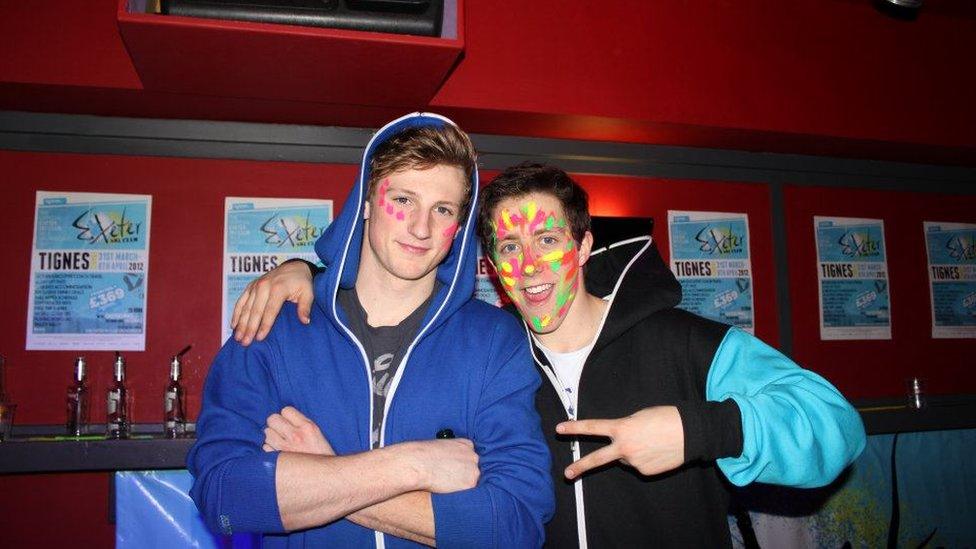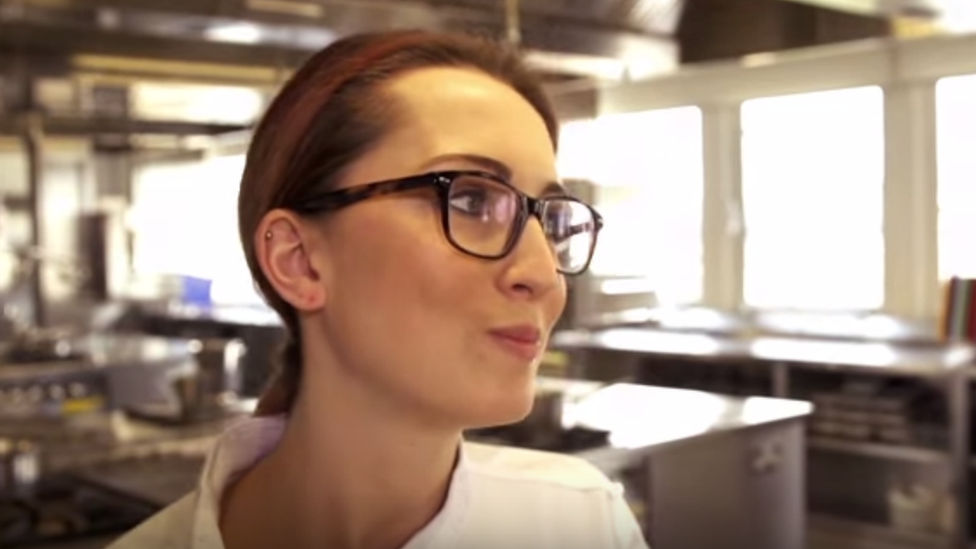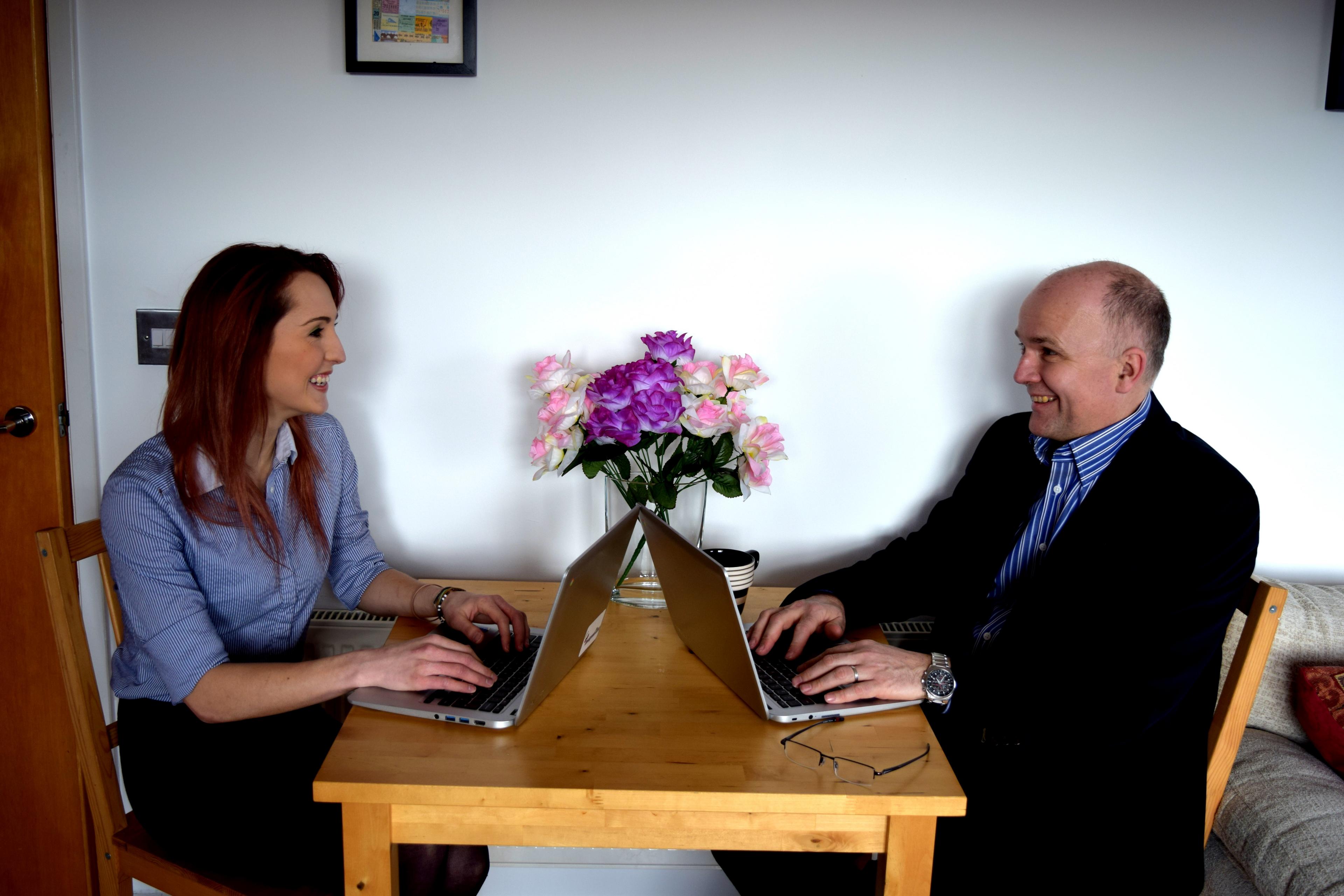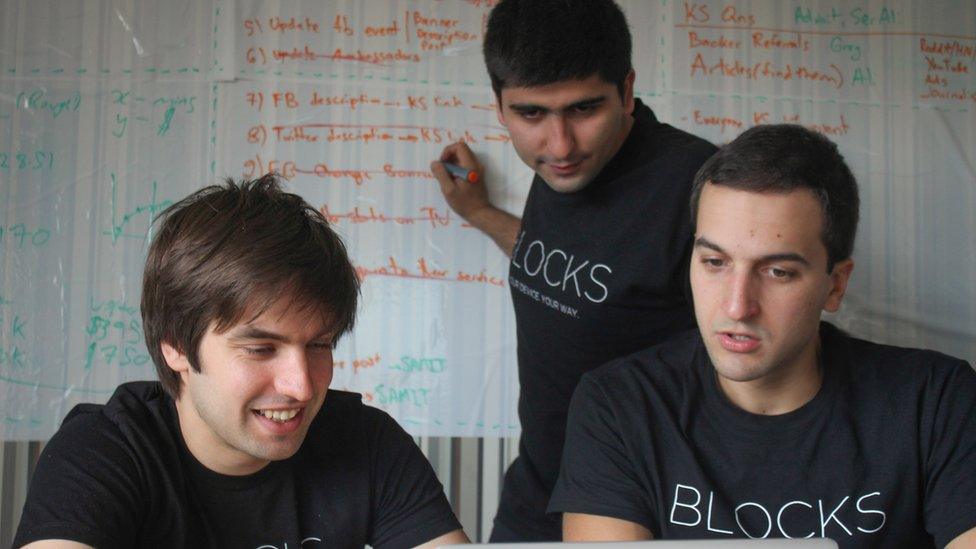The rise of the student entrepreneurs
- Published

Despite appearances, Chris Rea (right) is not a typical student
At 6am every weekday, Charleh Dickinson meditates and does a spot of yoga before checking her work emails. So far perhaps a typical start of the day for many mindful entrepreneurs.
But unlike most business owners, Ms Dickinson is also a third year student at Sheffield Hallam University, where she juggles her studies with clocking up 50 hours a week managing her healthy food brand Designed2Eat, which she set up with her father two years ago.
While her dad, Peter Dickinson, is in charge of the accounts and legal side of the firm, Ms Dickinson is the face of the business.
So in between lectures and studying, the food marketing management student can be handling sales, testing new products and managing the brand's social media.
If her week wasn't stretched enough, Ms Dickinson works part-time at a public relations company, is a member of the university's ski club, does daily fitness workouts, and has a boyfriend.

Ms Dickinson gets up at 6am every day
"I'm a sucker for routine and I always get up at 6am - to me it's just normal," says the 20-year-old. "I have crazy days running around like a headless chicken getting everything done in time, but you just deal with it."
Ms Dickinson's determination seems to be paying off. Designed2Eat, into which she has invested £4,000 so far, mainly from her student loan, while her dad has ploughed £10,000 in, now has 30 UK and European stockists.
These include gyms, farm shops and Sheffield Hallam University, and the business turns over about £4,000 every month.
Despite devoting so many hours to Designed2Eat, Ms Dickinson doesn't believe she's sidelined her university studies in the process.

Charleh Dickinson's father has invested £10,000 into the business, while she has put in £4,000
"It's had a positive impact - I came out with a first in my second year," she says. "A lot of people on my course go on placements, but I feel like I've come out with better knowledge having had my business at the same time."
Growing trend
This entrepreneurial spirit is present at campuses across the UK. Almost a quarter of students already run their own business or entrepreneurial venture, or plan to while at university, according to research by Santander bank.
Jonny Luk, chief executive of the National Association of College and University Entrepreneurs (NACUE), says the pace in the number of students setting up businesses at university has accelerated for two reasons.
"Firstly, technology means people can create digital businesses more easily, and we live in an interconnected world where getting advice is easier," he says.
"Secondly, since the financial crisis the attractiveness of joining a big corporation has been dulled by the excitement of being in a start-up. People want to be an entrepreneur."

Chris Rea (left) admits running a business initially meant he lost focus on his degree
US business graduate Chris Rea's entrepreneurial mindset was stoked as soon as he arrived at Exeter University five years ago. His first term saw him launch a beanie hat brand, but it was when onesies became a surprise hit in 2012 that Mr Rea spotted a real business opportunity.
Together with his fellow student Tom Carson, they jumped on the trend, each investing £1,500 from their student loan and savings to pay for samples, and set up a website. A year later Young Ones Apparel had developed into a full clothing range, including sweaters and T-shirts, and was also being sold at universities across the UK.
"I've always been entrepreneurial, it kind of becomes naturally to me," says Mr Rea, 23, who now works full-time on the brand. "With the onesies, I just thought if I can make some money as a student then I'm less dependent on my parents."
However, Mr Rea admits he struggled to nail the right work-study balance. "In my second year, I got the balance wrong. It was all new to me, and when we received a big deal I would just see dollar signs flashing in my head. I wasn't thinking about the end goal of my degree."
Failing to gain a 2:1 in his second year spurred Mr Rea into refocusing his time management, and he eventually graduated with a 2:1, although as an international hockey player for the US, he had "the biggest strain" of all when he was called up to travel to matches in Brazil and the States in his third year.
If that wasn't enough pressure, Mr Rea appeared on Dragon's Den during his third year exams, with Duncan Bannatyne offering £75,000 for a 40% share of the business. The duo accepted on the show but later turned it down.
By then Young Ones had turned into a serious business, with annual sales of £200,000 and gross profits of about £40,000, which was reinvested in the business.
Non-stop
It's a pressure all too familiar for Imperial College PhD student Serge Emerge, 26, as he gears up for the launch of his smart watch brand Blocks along with co-founders Omer El Fakir, 27, a fellow PhD student at Imperial, and graduate Alireza Tahmasebzadeh, 21.

Serge Emerge (left) regularly works 12-hour days on his start-up
The watch brand has received about $500,000 (£331,000) in seed funding since it was founded in 2013, and it has raised $1.4m via a crowdsourcing campaign to help deliver the product next April.
To achieve this goal, Mr Emerge has developed a strict regime - he devotes four days a week to his PhD, and three days to Blocks, where he's responsible for new partner relationships and software development.
"On those days it's non-stop - I'll be working from 10am to 10pm. Running a start-up with a lot of money raised is a big responsibility - it doesn't leave time for a social life, but quite often we'll take employees out for dinner to help build the team."
Despite the potential value of Blocks, Mr Emerge has never considered quitting his studies to focus solely on his business.
"My PhD is on something I'm passionate about - using technology to augment heath - it's an interesting subject," he says.
"There's pressure from both sides, but I'm very excited about the two things. One valuable thing I've learnt is that you can do well in your studies and run a start-up as long as you're efficient."
Mr Luk also dismisses any suggestion that running a business could jeopardise a degree.
"It's hard and challenging, and maybe some degrees get sidelined a bit, but for many this increases their CV," he says.
"It's important to have a mindset where you're solving problems - there's a demand for that, and it's more than you can get from a textbook."